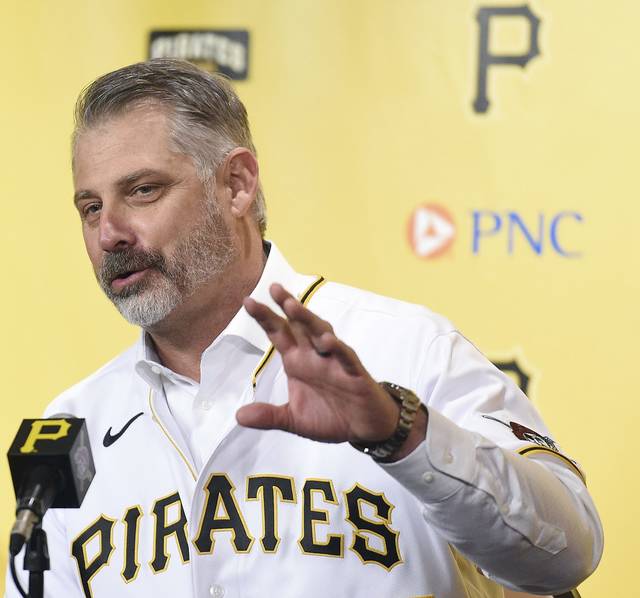https://triblive.com/sports/three-batter-rule-could-be-1-more-challenge-for-pirates-rookie-manager-shelton/
3-batter rule could be 1 more challenge for Pirates rookie manager Derek Shelton

Unless Rob Manfred has a change of heart, it will be a rule change that has the greatest effect on how managers deploy their personnel in more than four decades.
MLB’s commissioner said this past week during the winter meetings in San Diego a rule requiring pitchers to face at least three batters or finish a half-inning is on course to be implemented at the start of the 2020 season.
Though the MLB Players Association is opposed the rule — as are most general managers and managers — MLB has the right to unilaterally adopt it as part of the collective bargaining agreement between the two sides. Manfred believes the rule will help cut down the average times of games and improve pace of play.
The rule figures to have the biggest effect on in-game strategy since 1973 when the American League adopted the designated hitter.
The three-batter minimum is something Pittsburgh Pirates manager Derek Shelton would have to deal with in 2020 in his first year on the job after being hired Nov. 27 to replace Clint Hurdle.
However, Shelton is not stressing over the rule. It is just going to be something else he learns to navigate while managing at the major league level for the first time.
“I think it’s just one of those things we’re going to toy with, and it may be different in how we create our roster but, going forward, I think it’s going to be a little fluid,” Shelton said.
The three-batter minimum will affect reliever usage. The days of the left-handed specialist who comes out of the bullpen to face one lefty hitter in a key situation probably are gone.
Many teams have gotten away from carrying left-on-left specialists on their rosters in recent seasons. The previous Pirates regime believed they were a waste of a roster spot and preferred relievers who could retire multiple batters.
Shelton is more interested in how the new rule will affect managers tactically from an offensive standpoint. Shelton was the Minnesota Twins bench coach from 2018-19 and said he and manager Rocco Baldelli discussed the ramifications of the three-batter minimum late last season.
Most managers said at the winter meetings they feel the best way to counteract the rule is by splitting right-handed and left-handed hitters in the batting order as much as possible.
“I do think it’s going to adjust how you build your lineup, and I think some people that felt strongly about going back and forth now may re-evaluate that, and, honestly, it’s a really good question,” Shelton said. “So it’s something we’ll continue to talk about and we’ll talk about with our group and scouts, probably with the players a little bit. Yeah, I think it’s going to change how people look at it.
“I think switch hitters are going to become gold in this market because of the ability to do a back and forth, but I think it’s really going to matter who your personnel is.”
That bodes well for Shelton because two of the Pirates’ best hitters in an otherwise dismal 69-93 season in 2019 batted from both sides of the plate.
Outfielder Bryan Reynolds hit .314/.377/.503 with 16 home runs in 134 games, finishing fourth in the National League Rookie of the Year voting.
First baseman Josh Bell gained a starting spot on the NL All-Star team on his way to leading the team with 37 home runs and 116 RBIs. He batted .277/.367/.569 in 143 games.
“It’ll be interesting to see how it all plays out,” Shelton said.
His fellow managers concur, including Dave Martinez, who led the Washington Nationals to the World Series title last season.
“I’ve been kind of contemplating things in my head, what we want to do and what we want to see and the kind of pitchers we want in our bullpen,” Martinez said. “It’ll definitely be a change.”
Copyright ©2026— Trib Total Media, LLC (TribLIVE.com)
